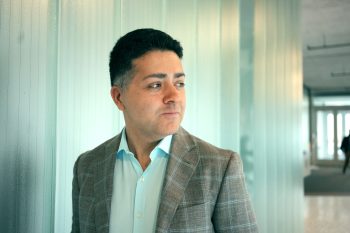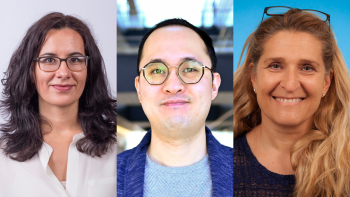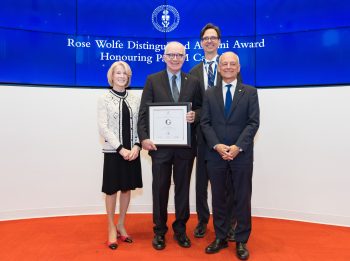Professor Deepa Kundur (ECE) succeeds Professor Mark Korschot (ChemE) as chair of the Division of Engineering Science. She sat down with Marit Mitchell to discuss her vision for the next five years, challenges ahead, and what makes the Engineering Science program unique.
What motivated you to take on the role of chair?
For me, U of T represents an ideal academic ecology: it’s a synergistic interaction of research ideas, students, course development and service, to provide this multi-faceted stimulus for intellectual advancement. I think students are a critical part of that ecology, bringing in new ideas and catalyzing the development of innovative concepts. So for me, being part of that through the Division of Engineering Science (EngSci), which I believe is a leader in attracting exceptional students to engineering, was just a wonderful opportunity. And to work with Dean Amon, who has led a number of exceptional initiatives that have brought the Faculty of Applied Science & Engineering forward — it’s just a great opportunity.
What makes EngSci such a special program within U of T Engineering, across Canada and around the world?
Engineering Science has a very unique culture, and that’s because our students are fearless. Not only are they exceptional academically and intellectually, they have an ambition and drive that I think is very unique. They’re curiosity driven. So our students are very special — that’s first. Another reason is our curriculum: it’s extremely high quality, with the first two years being both general and highly theoretical. We teach our students to apply mathematical principles, scientific principles, to new areas very rapidly. Unique design opportunities teach them to think outside of the box. We also uniquely borrow expertise from the other U of T Engineering departments — we’re able to learn from what’s interesting and leading-edge in those departments and bring it to our students.
What challenges do you anticipate in the next five years?
The landscape of education is changing. We see this with massive open online courses, MOOCs, and it’s very exciting because it makes education more accessible and it makes obtaining degrees more flexible. So the challenge for a more traditional, high-quality program such as Engineering Science is that we have to make our value proposition clear. Because we ask students to be physically on campus, and it is an intense academic program — we push the limits of learning. So I think it’s important to revisit our value proposition and better communicate that, to show what we deliver beyond those highly scalable learning environments that are proliferating.
I think we do that by making it clear that we focus on the fundamentals, offer an interdisciplinary environment, and have students who are exceptional and are here to interact with other exceptional students. We offer enhanced entrepreneurship opportunities, and entrepreneurship is a very social thing — it’s not possible to do that online. We provide diversity of experience, and there’s that culture of fearlessness. With the globalized economy, we are graduating students who can stand the test of time and compete.
I’ve had the opportunity to talk to a lot of our alumni who have done significant things, and I’ve asked them what it is about EngSci. And many of them said to me that it was about that fearlessness — they said that because they made it through the program, they knew if they went to Silicon Valley they could compete against the Harvard grads, the MIT grads. They chose this program because it’s hard, and that’s what distinguishes our students.
What advice did you receive from your predecessor, Professor Mark Kortschot?
Taking on this role, I feel it’s like standing on the shoulders of giants — the many chairs who created, developed and continue to enhance the program. Mark’s advice to me was on that theme: with EngSci, because it’s an exceptional, top-ranked program, we want to maintain its high standards and leave it in an even better place than where we started. It has a lot of momentum, and I think institutions such as U of T that are very high quality have momentum that we can leverage. Other than make improvements and keep up with the changing landscape in education, I want to keep that momentum.
What are your leadership goals for the next five years?
If you look at the interests of our students over the last 20 years, and I knew many EngSci students when I was in the ECE undergraduate program, is there’s a shift taking place toward a greater interest in entrepreneurship. A significant proportion of our students still go to graduate school, but now we’re also seeing an increase in entrepreneurship activity. One of the things I’d like to do is leverage support from established research-to-entrepreneurship tech transfer initiatives in the Faculty, and provide those opportunities to Engineering Science students. Right now they have access to terrific offerings such as The Entrepeneurship Hatchery and Start@UTIAS, and I’d like to see if there’s anything we can do within the Division to make it easier for students to be successful in entrepreneurship.
The second thing I’d like to do is emphasize innovations in engineering education. Right now, we have courses that confer knowledge, but if someone’s smart they can usually figure it out on their own. But there are certain skills such as design — creativity, thinking out of the box — that is so important to the knowledge economy. These things are not something you can necessarily pick up from a book. So I’d like us to better integrate the best practices that we’d seen in design, in creative thinking, into the Engineering Science curriculum, and I think we have a lot of potential to be successful in that.
Last, Professor Kortschot devoted concerted effort to establishing strong relationships with our alumni. Thanks to that, we’re seeing incredible interactions and engagement between our alumni and existing students, through professional development, mock interviews, mentorship. I want to keep enhancing those relationships, and not being a former EngSci myself, I would love to hear their ideas about the direction of the program overall.
What are you most excited about in this role?
In academia, we largely contribute in terms of the teaching we do, as well as our research — what this role provides is the opportunity to have impact in a very different way. I have a unique perspective in that I was with U of T from 1999 to 2002, when I did teach the EngSci students, and then I returned 10 years later [from a faculty appointment at Texas A&M University]. So I have a snapshot of the Division of Engineering Science 10 years apart, and I’m just really excited about the growth and support that’s being provided to the students. To be able to a part of that, and be able to develop, lead and guide that is very exciting to me.



